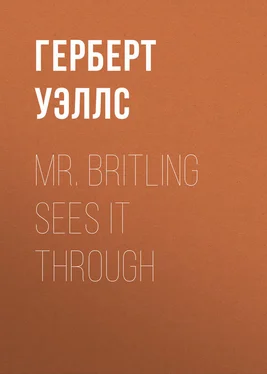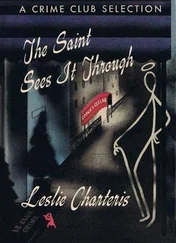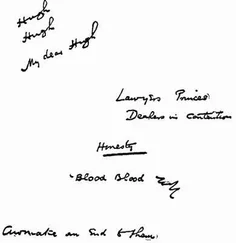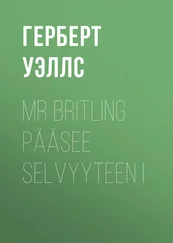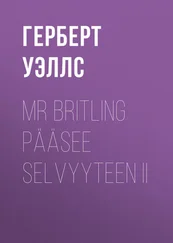Герберт Уэллс - Mr. Britling Sees It Through
Здесь есть возможность читать онлайн «Герберт Уэллс - Mr. Britling Sees It Through» — ознакомительный отрывок электронной книги совершенно бесплатно, а после прочтения отрывка купить полную версию. В некоторых случаях можно слушать аудио, скачать через торрент в формате fb2 и присутствует краткое содержание. Жанр: История, foreign_prose, на английском языке. Описание произведения, (предисловие) а так же отзывы посетителей доступны на портале библиотеки ЛибКат.
- Название:Mr. Britling Sees It Through
- Автор:
- Жанр:
- Год:неизвестен
- ISBN:нет данных
- Рейтинг книги:3 / 5. Голосов: 1
-
Избранное:Добавить в избранное
- Отзывы:
-
Ваша оценка:
- 60
- 1
- 2
- 3
- 4
- 5
Mr. Britling Sees It Through: краткое содержание, описание и аннотация
Предлагаем к чтению аннотацию, описание, краткое содержание или предисловие (зависит от того, что написал сам автор книги «Mr. Britling Sees It Through»). Если вы не нашли необходимую информацию о книге — напишите в комментариях, мы постараемся отыскать её.
Mr. Britling Sees It Through — читать онлайн ознакомительный отрывок
Ниже представлен текст книги, разбитый по страницам. Система сохранения места последней прочитанной страницы, позволяет с удобством читать онлайн бесплатно книгу «Mr. Britling Sees It Through», без необходимости каждый раз заново искать на чём Вы остановились. Поставьте закладку, и сможете в любой момент перейти на страницу, на которой закончили чтение.
Интервал:
Закладка:
The visitor family and Mr. Carmine and his young Indian departed. "Come to hockey!" shouted Mr. Britling to each departing car-load, and Mr. Carmine receding answered: "I'll bring three!"
Then Mr. Direck, in accordance with a habit that had been growing on him throughout the evening, looked around for Miss Cissie Corner and failed to find her. And then behold she was descending the staircase with the mysterious baby in her arms. She held up a warning finger, and then glanced at her sleeping burthen. She looked like a silvery Madonna. And Mr. Direck remembered that he was still in doubt about that baby…
Teddy, who was back in his flannels, seized upon the perambulator. There was much careful baby stowing on the part of Cecily; she displayed an infinitely maternal solicitude. Letty was away changing; she reappeared jauntily taking leave, disregarding the baby absolutely, and Teddy departed bigamously, wheeling the perambulator between the two sisters into the hazes of the moonlight. There was much crying of good nights. Mr. Direck's curiosities narrowed down to a point of great intensity…
Of course, Mr. Britling's circle must be a very "Advanced" circle…
§ 10
Mr. Direck found he had taken leave of the rest of the company, and drifted into a little parlour with Mr. Britling and certain glasses and siphons and a whisky decanter on a tray…
"It is a very curious thing," said Mr. Direck, "that in England I find myself more disposed to take stimulants and that I no longer have the need for iced water that one feels at home. I ascribe it to a greater humidity in the air. One is less dried and one is less braced. One is no longer pursued by a thirst, but one needs something to buck one up a little. Thank you. That is enough."
Mr. Direck took his glass of whisky and soda from Mr. Britling's hand.
Mr. Britling seated himself in an armchair by the fireplace and threw one leg carelessly over the arm. In his black velvet cloak and cap, and his black silk tights, he was very like a minor character, a court chamberlain for example, in some cloak and rapier drama. "I find this week-end dancing and kicking about wonderfully wholesome," he said. "That and our Sunday hockey. One starts the new week clear and bright about the mind. Friday is always my worst working day."
Mr. Direck leant against the table, wrapped in his golden pheasants, and appreciated the point.
"Your young people dance very cheerfully," he said.
"We all dance very cheerfully," said Mr. Britling.
"Then this Miss Corner," said Mr. Direck, "she is the sister, I presume, is she? of that pleasant young lady who is married – she is married, isn't she? – to the young man you call Teddy."
"I should have explained these young people. They're the sort of young people we are producing over here now in quite enormous quantity. They are the sort of equivalent of the Russian Intelligentsia, an irresponsible middle class with ideas. Teddy, you know, is my secretary. He's the son, I believe, of a Kilburn solicitor. He was recommended to me by Datcher of The Times . He came down here and lived in lodgings for a time. Then suddenly appeared the young lady."
"Miss Corner's sister?"
"Exactly. The village was a little startled. The cottager who had let the rooms came to me privately. Teddy is rather touchy on the point of his personal independence, he considers any demand for explanations as an insult, and probably all he had said to the old lady was, 'This is Letty – come to share my rooms.' I put the matter to him very gently. 'Oh, yes,' he said, rather in the manner of some one who has overlooked a trifle. 'I got married to her in the Christmas holidays. May I bring her along to see Mrs. Britling?' We induced him to go into a little cottage I rent. The wife was the daughter of a Colchester journalist and printer. I don't know if you talked to her."
"I've talked to the sister rather."
"Well, they're both idea'd. They're highly educated in the sense that they do really think for themselves. Almost fiercely. So does Teddy. If he thinks he hasn't thought anything he thinks for himself, he goes off and thinks it different. The sister is a teacher who wants to take the B.A. degree in London University. Meanwhile she pays the penalty of her sex."
"Meaning – ?" asked Mr. Direck, startled.
"Oh! that she puts in a great deal too much of her time upon housework and minding her sister's baby."
"She's a very interesting and charming young lady indeed," said Mr. Direck. "With a sort of Western college freedom of mind – and something about her that isn't American at all."
Mr. Britling was following the train of his own thoughts.
"My household has some amusing contrasts," he said. "I don't know if you have talked to that German.
"He's always asking questions. And you tell him any old thing and he goes and writes it down in his room upstairs, and afterwards asks you another like it in order to perplex himself by the variety of your answers. He regards the whole world with a methodical distrust. He wants to document it and pin it down. He suspects it only too justly of disorderly impulses, and a capacity for self-contradiction. He is the most extraordinary contrast to Teddy, whose confidence in the universe amounts almost to effrontery. Teddy carries our national laxness to a foolhardy extent. He is capable of leaving his watch in the middle of Claverings Park and expecting to find it a month later – being carefully taken care of by a squirrel, I suppose – when he happens to want it. He's rather like a squirrel himself – without the habit of hoarding. He is incapable of asking a question about anything; he would be quite sure it was all right anyhow. He would feel that asking questions betrayed a want of confidence – was a sort of incivility. But my German, if you notice, – his normal expression is one of grave solicitude. He is like a conscientious ticket-collector among his impressions. And did you notice how beautifully my pianola rolls are all numbered and catalogued? He did that. He set to work and did it as soon as he got here, just as a good cat when you bring it into the house sets to work and catches mice. Previously the pianola music was chaos. You took what God sent you.
"And he looks like a German," said Mr. Britling.
"He certainly does that," said Mr. Direck.
"He has the fair type of complexion, the rather full habit of body, the temperamental disposition, but in addition that close-cropped head, it is almost as if it were shaved, the plumpness, the glasses – those are things that are made. And the way he carries himself. And the way he thinks. His meticulousness. When he arrived he was delightful, he was wearing a student's corps cap and a rucksack, he carried a violin; he seemed to have come out of a book. No one would ever dare to invent so German a German for a book. Now, a young Frenchman or a young Italian or a young Russian coming here might look like a foreigner, but he wouldn't have the distinctive national stamp a German has. He wouldn't be plainly French or Italian or Russian. Other peoples are not made; they are neither made nor created but proceeding – out of a thousand indefinable causes. The Germans are a triumph of directive will. I had to remark the other day that when my boys talked German they shouted. 'But when one talks German one must shout,' said Herr Heinrich. 'It is taught so in the schools.' And it is. They teach them to shout and to throw out their chests. Just as they teach them to read notice-boards and not think about politics. Their very ribs are not their own. My Herr Heinrich is comparatively a liberal thinker. He asked me the other day, 'But why should I give myself up to philology? But then,' he reflected, 'it is what I have to do.'"
Mr. Britling seemed to have finished, and then just as Mr. Direck was planning a way of getting the talk back by way of Teddy to Miss Corner, he snuggled more deeply into his chair, reflected and broke out again.
Читать дальшеИнтервал:
Закладка:
Похожие книги на «Mr. Britling Sees It Through»
Представляем Вашему вниманию похожие книги на «Mr. Britling Sees It Through» списком для выбора. Мы отобрали схожую по названию и смыслу литературу в надежде предоставить читателям больше вариантов отыскать новые, интересные, ещё непрочитанные произведения.
Обсуждение, отзывы о книге «Mr. Britling Sees It Through» и просто собственные мнения читателей. Оставьте ваши комментарии, напишите, что Вы думаете о произведении, его смысле или главных героях. Укажите что конкретно понравилось, а что нет, и почему Вы так считаете.
